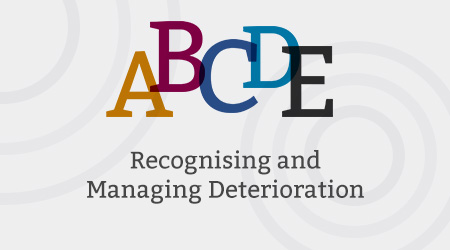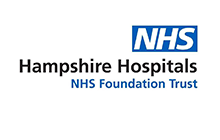About the recognising and managing deterioration programme
Changes to vital signs, behaviour and mental state often occur before a serious event, such as cardiac arrest. Being able to recognise and act on these changes are essential skills to improving patient safety and outcomes.
Deterioration in patients.pdf >
The Recognising and Managing Deterioration programme has been developed to support the workforce and organisations in ensuring staff have the necessary knowledge and skills to recognise and manage deterioration in adult patients. The programme includes resources on the National Early Warning Score (NEWS2), which is endorsed by NHS England and NHS Improvement for use in acute and ambulance settings.
Signs of Life - Educational Game
Signs of life is a simulated training resource, where healthcare professionals can practice the care of the deteriorating patient. The game is played out in a hospital ward or nursing home setting. In real time scenarios, players record a patient’s vital signs in a simulated work situation, decide what interventions are required and are given critical feedback on the best clinical decisions to take.
Ufi VocTech Trust funded the development of the game which has been produced by Desq, staff from Dudley Group NHS Foundation Trust and a former care sector nurse.
Recognising and managing deterioration elearning
The recognising and managing deterioration elearning module has been developed for a wide variety of health and social care professionals working in clinical environments where adults could physically deteriorate.
This resource is structured around the ABCDE assessment tool and allows participants to revise their anatomy and physiology, develop their skills and knowledge in the assessment process to recognise deterioration and manage the findings within the scope of their clinical role.
The resource is offered at 2 levels (Universal and Advanced) to reflect the participant’s experience and clinical setting.
Receptionist training package
A learning resource for reception staff, composed of training resources and a workbook, has been developed by HEE in collaboration with Hartlepool and Stockton Health, as an introduction for reception staff to address the deteriorating patient.
Receptionists are commonly the first point of contact for people with acute health needs. This training helps receptionists recognise specific symptoms that may indicate a deteriorating patient, and how they would consider escalating this to a clinician within their service or practice. It particularly focuses on to the symptoms of chest pain, stroke, sudden breathlessness and sepsis.
Resources by settings
Use the links below to find resources relevant to your setting.
Selecting the links will open a new tab in your browser and take you directly to the relevant area of the programme.
-
Primary Care
- NEWS in Primary Care elearning
The NEWS in Primary Care session introduces the National Early Warning Score (NEWS) and its use in a primary care setting. It also includes:
- Evidence of NEWS and its use in the community.
- Its effective use between primary and secondary care.
- Links to other useful resources and references for further research.
The Case studies of NEWS in Primary Care session contains practical examples of when NEWS could be used and offers the primary care clinician the opportunity to consider how they might manage patients in similar situations.
- Sepsis and NEWS webinar
The Sepsis and NEWS (National Early Warning Score) webinar took place on 17 March 2020, hosted by Alison Tavaré, Primary Care Clinical Lead, West of England Academic Health Science Network.
This webinar addresses NEWS:
- How it supports the identification and early management of the deteriorating patient.
- Its use in primary care.
- Emerging evidence for community settings.
- How to support the identification of the patients with possible COVID-19, referring to sources of information and data that will offer real time updates on its future treatment.
- Train the Trainer package
This training package contains all sections of the NEWS in Primary Care elearning in a PowerPoint format and can be used in a facilitated learning session.
-
Secondary Care
The Secondary Care training package has been developed for healthcare staff in secondary care settings and comprises two learning resources:
This resource covers:
- The need for a National Early Warning Score (NEWS) and the evidence to support its use.
- Raising awareness and increase understanding of how the National Early Warning Score (NEWS) is used in the recognition and response to deterioration in secondary care settings.
- Understanding the purpose of SBARD as a structured communication tool.
This resource supports the effective diagnosis and management of NEWS in relation to deterioration, and includes case studies on:
-
Social Care
Deterioration, NEWS and sepsis in care homes
These learning resources on Deterioration, NEWS and sepsis have been designed in particular for care home staff to ensure care home residents receive appropriate, timely medical care. They provide a comprehensive training for non-clinical carers in the community. The training may also be suitable for health care assistants working in other settings and nursing students.
This is a mainly film-based course that covers:
- An introduction to NEWS in care home settings and its benefits
- An introduction to sepsis and serious illness
- The importance and significance of soft signs
- An overview of each component part of NEWS and how to measure:
- Respiratory rate
- Oxygen saturations
- Blood pressure
- Pulse rate
- Level of alertness
- Temperature
Coming soon
NEWS in Mental Health
A NEWS in Mental Health training resource is currently being written. The training will offer learners an overview of NEWS, as well as specific case studies relevant to staff working in a mental health setting.
NEWS in Ambulance services
A NEWS in Paramedics training resource is currently being written. The training will offer learners an overview of NEWS, as well as specific case studies relevant to staff working in an ambulance service.
Further resources
Further NEWS resources have been referenced within the sepsis learning materials: https://www.e-lfh.org.uk/programmes/sepsis/
COVID support: Working with partners we have developed an animation for patients on COVID, how to measure oxygen levels (using a pulse oximeter), what the danger signs to look out for are and when to seek urgent help. This is accompanied with a standard operating procedure and patient information leaflet.
Meet the team

Antonio De Gregorio
Programme Coordinator – Antimicrobial Resistance and Sepsis, Health Education England, Population Health and Prevention Team
Mohamed Sadak
Clinical Lead and Programme Manager, Antimicrobial Resistance and Sepsis, Health Education England, Population Health and Prevention Team
Janet Flint
Programme Lead, Health Education England, Population Health and Prevention Team
Dr Chris Carey
Associate Postgraduate Dean, Health Education England Kent, Surrey, Sussex
Dr Sanjiv Ahluwalia
Postgraduate Dean, Health Education England, North Central and East London
Dr Simon Stockley
Content author Receptionist training package
Dr Alison Tavaré
Content author, NEWS in Primary Care training & Deterioration, NEWS and Sepsis in Care Homes
Dr Matt Inada-Kim
Content author, Consultant Acute Physician, & Sepsis Lead, Hampshire Hospitals NHS Foundation Trust National Clinical Director Infection, Antimicrobial resistance and Deterioration (NHS England & NHS Improvement)
Sue Maddex
Senior Lecturer, London South Bank University, Content Author of Recognising and Managing Deterioration
Claire Nadaf
Senior Lecturer, Bournemouth University, Content Author of Recognising and Managing Deterioration
Danielle Fullwood
Senior Nurse; Professional Development, Health Education England, Content author of Secondary Care training package
Alan Ryan
National Programmes Director, Health Education England
Emma Nye
Programme Manager, HEE elearning for healthcare
Jon Collins
Project Manager, HEE elearning for healthcare
Victoria Ward
Lead Learning Designer, HEE elearning for healthcare
Tracy Watkins
Learning Designer, HEE elearning for healthcare
Jenny Berrisford
Learning Designer, HEE elearning for healthcare
Rashmi Chavda
Graphic Designer, HEE elearning for healthcare
Leanne Hargreaves
Stakeholder Officer, HEE elearning for healthcare
How to access
Available to all
The News and Deterioration programme is freely available to access here.
Please note your progress and completion of sessions will not be recorded and you will not be able to generate a record of completion. If you require evidence of learning, please register and then log in to access this programme on the elfh Hub.
If you already have an account with elfh, then you can enrol on to the News and Deterioration programme by logging in to the elfh Hub, selecting My Account > Enrolment and selecting the programme. You can then access the programme immediately in the My elearning section.
To view the News and Deterioration programme, select the View button below. If you already have an account with elfh, you will also be able to login and enrol on the programme from the View button.
Registering large numbers of users
If you are a HR, IT or Practice Manager and would like to register and enrol large numbers of staff within your organisation for access onto the News and Deterioration programme, please contact elfh directly.
Organisations wishing to use their own LMS
For HR departments wanting to know more about gaining access to courses using an existing Learning Management System please contact elfh directly to express interest.
More information
Please select the following link for more information on how to use the elfh Hub.










